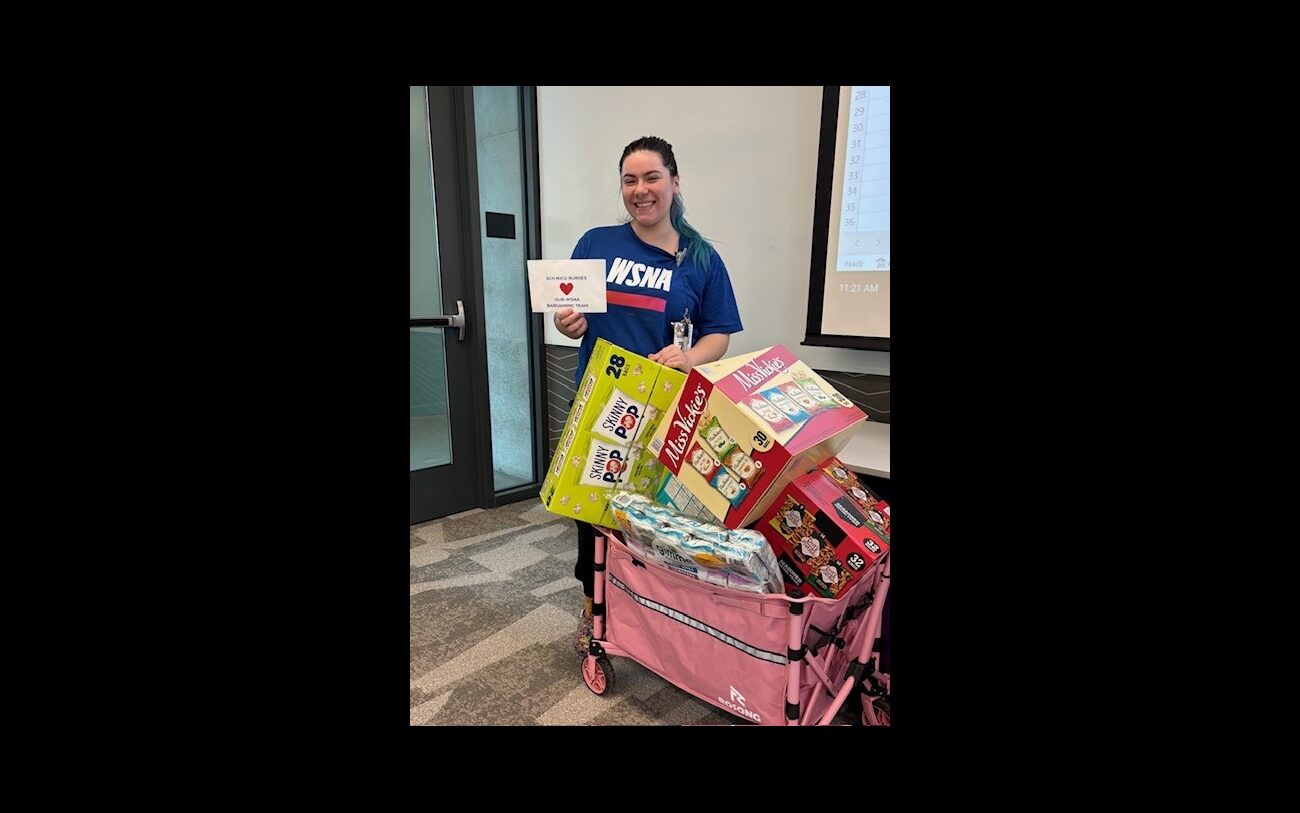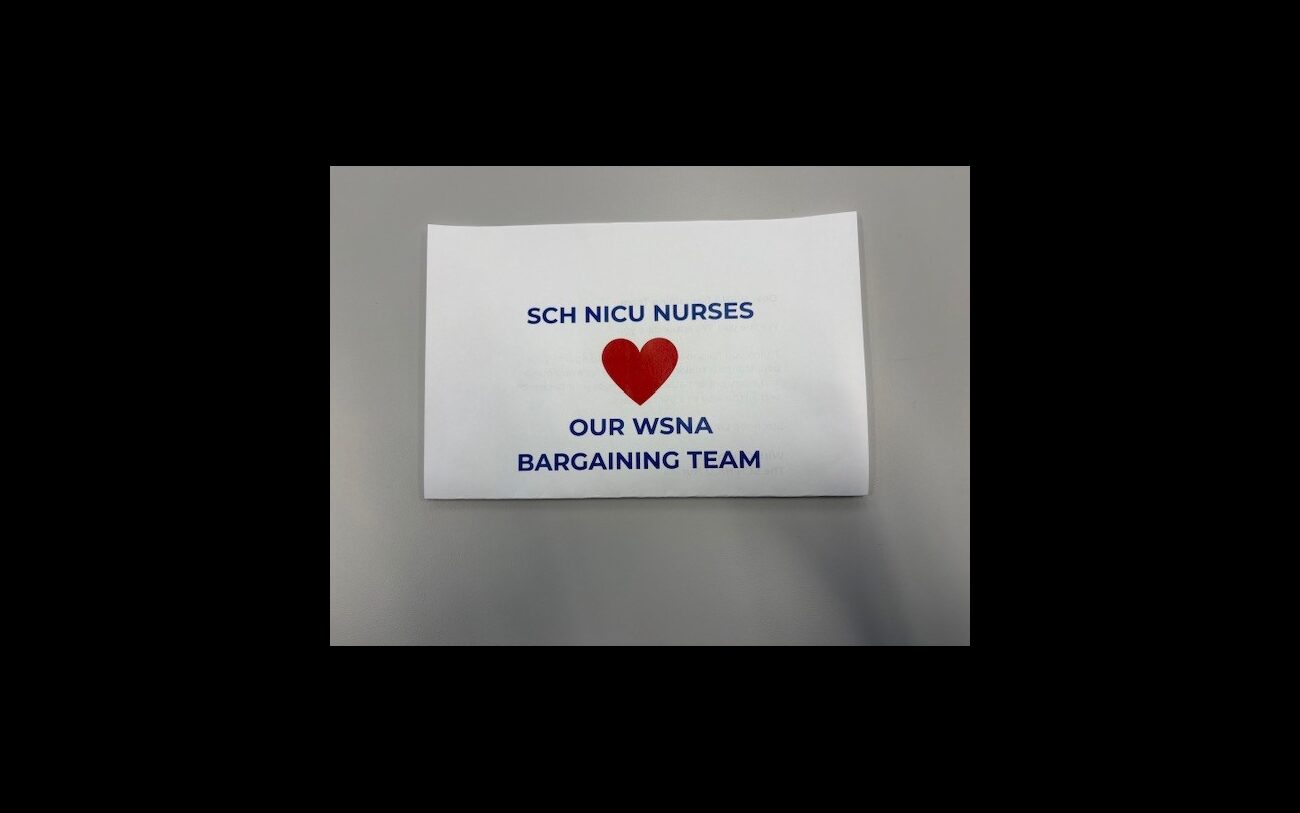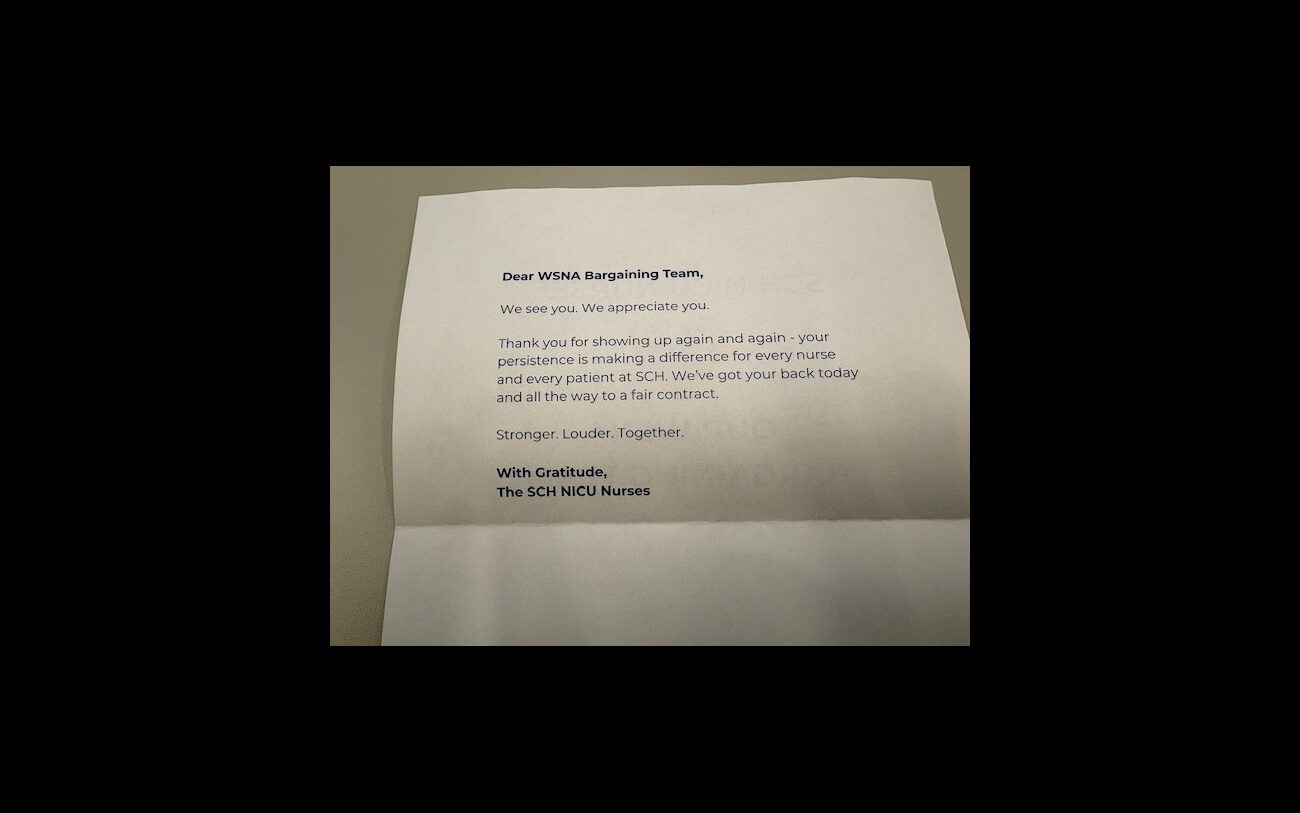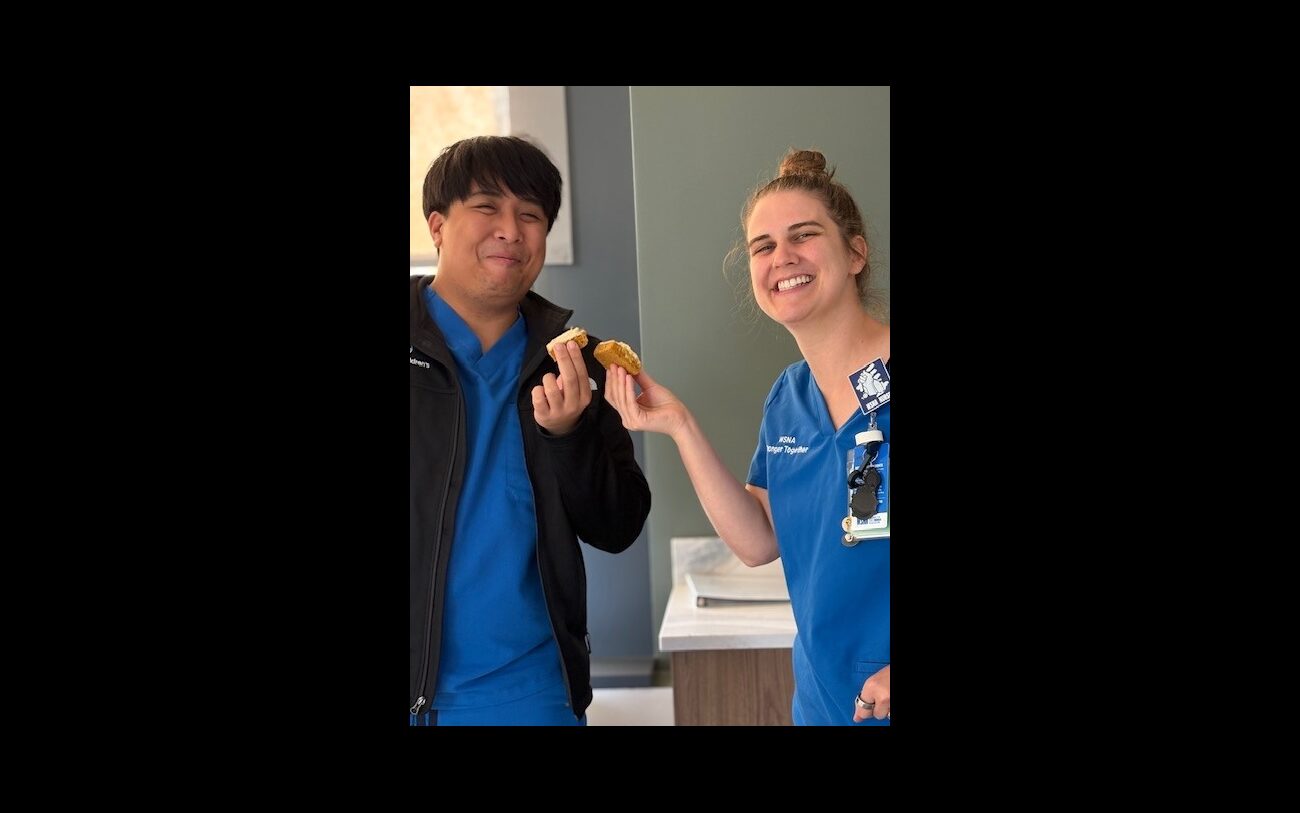Bargaining Update Session #22
Posted Oct 31, 2025
Slow Movement Forward
At our two bargaining sessions this week, we had the help of a federal mediator, which we are thankful to have even during the government shutdown. The mediator asked us to focus on language issues and with his help we are much closer to an agreement on issues relating to union access and representation, schedules and overtime, and workplace violence. Focusing on these areas has led to the most movement we have seen from the Hospital. But the process is frustratingly slow, and the focus on language issues has meant that we did not receive a counter from Seattle Children’s on any of the major open economic issues, including the wage scale, break relief nurses, or sick leave.
Where We Stand
- We have a tentative agreement on a New Technology article. The fully-agreed TA language is below.
- Workplace Violence (WPV).
- Lots of New Language. The Hospital has engaged deeply at the bargaining table with WSNA to greatly expand CBA language in the area of WPV. We appreciate the Hospital’s extensive work in this area and its willingness to fight for resources to make a real difference on the floor. We are very close to an agreement on WPV language that will provide meaningful protections to nurses.
- PBMU Security. Our persistence and dedication to pushing for security presence on the PBMU was met with a commitment (as part of a larger package that has not been agreed to yet) to scheduling a minimum of 2 security personnel 24/7 in that vulnerable unit. We very much appreciate the Hospital’s hard work to find a way to dedicate resources that will meaningfully improve safety for nurses.
- Paid Time Off for WPV Injuries. WSNA has asked for three days of paid time off (subject to SCH sick leave policies) when a nurse is a victim of WPV. The Hospital’s current proposal (as part of a larger package that is not TAed) is that nurses may use up to two days of accrued sick leave, accrued annual leave, or unpaid time off without an attendance occurrence if injuries sustained from WPV restrict their ability to work.
- Fighting off take-aways. Our efforts in several language areas this week were continuing to fight off take-aways proposed by SCH in the areas of union access, leaves, and medical benefits. We will continue to fight to protect your rights!
Nurses’ sick leave banks are depleted, leaving them little to no paid sick time available if they are injured by WPV. Based on data provided by SCH in negotiations, 37% of nurses have less than 12 hours of accrued sick time, and 51% of nurses have less than 24 hours of sick time remaining. That means that more than half of SCH nurses have less than 2 shifts (for 12-hour nurses) or less than 3 shifts (for 8-hour nurses) of sick time available if they are injured due to WPV. The statistics are worse for nurses working on the PBMU: 67% of PBMU nurses have less than 12 hours of sick time, while 81% have less than 24 hours of sick leave available. We are grateful that SCH has, with the help of the mediator, begun to engage with us on this issue.
Much of the hospital’s movement this week was tied up with other issues we remain far apart on, including preserving/expanding existing health equity and anti-racism language and securing maintenance of benefits while on leave. So plain and simple, we still have a lot of work ahead of us.
New Technology Language – We reached a TA!
- The Employer and the Union recognize that the overriding principle governing the introduction and use of technologies, including but not limited to artificial intelligence, should be providing the highest quality patient care and promoting patient health and safety. Utilization of technology should support the provision of safe, therapeutic, effective care by nurses. This occurs within the structure of the nursing process, including the nurse’s exercise of clinical judgment in assessment, diagnosis, planning, implementation, and evaluation of patient care, and acting as a patient advocate.
- Technology should enhance patient care and advance the healthcare outcomes for all patients. Technology should support safe, quality patient care and be utilized in a manner to safeguard patient confidentiality.
- Technology used in a clinical setting is intended to complement, not diminish, nursing skills, judgment, and decision-making. Technology provides information and tools to support clinical decision-making as appropriate. The use of technology should be considered by the Hospital Staffing Committee when preparing staffing plans. Nurses are responsible for the provision of safe, quality patient care and are expected to use appropriate technology and equipment when it is available to perform their duties.
- The use of interactive technology, such as chat bots or generative artificial intelligence, interacting with patients or their families will not identify itself as a nurse providing care. Nurses’ credentialing information will not be used by technology to attest to the provision of services for which they did not provide or independently validate.
- The Employer shall provide bargaining unit members with training and appropriate job aids regarding the appropriate use of any technology they are expected to use in their work. All such training shall be considered hours worked and shall be paid at the appropriate rate of pay. Nurses should inform the Employer in the event any technology or equipment is not available, working, or in functioning order such that it is impacting their ability to provide the expected level of care. No nurse shall be disciplined for informing the Employer of any such concern or for a technology failure.
- The Employer shall involve the Nursing Clinical Quality Council or other committee comprised at least in part of bargaining unit nurses with the integration of newly introduced or novel clinical technology, intended to be integrated into the nursing process in a manner which will materially affect the direct delivery of patient care.
- The Conference Committee may provide input regarding newly implemented technology affecting the delivery of direct patient care as well as the continued utilization, function, needed maintenance, replacement and repair of current technology and technological equipment. Nurses are encouraged to raise concerns or recommendations to department leadership. Likewise, Nurses may independently raise concerns or recommendations to the Conference Committee for review.
Next Steps
- Only two scheduled sessions remain - just around the corner on Monday and Tuesday, so hopefully we can continue to make progress, ideally less incrementally and on more of the major issues.
- Because we are great nurses, we need to be prepared for all possible outcomes. We’re evaluating our options to increase pressure if we can’t solve all issues by Tuesday. To that end, we will be having a big virtual meeting on Wednesday at 6 pm to talk through next steps.
Announcement of Strike Preparations
Despite unambiguous support for our campaign from key members of our community including the Martin Luther King Central Labor Council, Dr. Danielson, and numerous elected officials urging management to do the right thing for nurses and the children whom they care for, our bargaining team is now left with no choice but to ramp up preparations for a potential winter strike. This escalation is a necessary step to put meaningful pressure on the hospital to address our reasonable demands for a fair contract. Our strength lies in our unity and our readiness to take collective action, and we want every member to be prepared for the possibility of a work stoppage in the coming months. Further details on how you can get involved and what this preparation entails will be shared at upcoming union meetings.
This decision was not taken lightly. Join us, our WSNA Rep, Legal team, and Organizing team on Wednesday, November 5th as we recap how we got to this place, what you can expect in the coming months and the help that we will need to make sure that every nurse here has the opportunity to have their voice heard.
Join the Virtual Local Unit Meeting Next Wednesday
Why: Talk about preparations to strike and next steps
When: Wednesday, November 5 at 6 pm
Where: Microsoft Teams Meeting (we will send out a link via text the morning of the 5th)
Strike School
- We will need members from every unit to sign up to be Strike Captains. A Strike Captain’s role is to help have a conversation with and assess every individual union nurse who is working at SCH and the affiliated clinics on their willingness to strike over the issues we continue to fight for in bargaining.
- Keep an eye out for dates and times to join our strike school and learn how you can help.
Come Observe Mediation Next Week
- As we move deeper into federal mediation, it remains important for people to come observe the challenging process of getting us to a contract that we can feel confident to vote yes on. It is critical that we trust each other and one of the most powerful tools that we have is our continued commitment to transparency with membership.
- There will be times when we need to talk as a team about strategy and may ask observers to step out of the room for a moment, but the process itself belongs to all of us.
Upcoming Mediation Dates (Next Monday/Tuesday)
When: November 3 and November 4 (9 am start time)
Where: 1916 Boren Ave, Seattle, WA
Bring your badge, your lunch, and wear your WSNA blue
A HUGE thank you to the NICU nurses and Zachary Rakke for providing delicious snacks for the bargaining team!
Do not hesitate to contact any of the officers if you have questions. All of our contacts are on our WSNA website. https://www.wsna.org/union/seattle-childrens-hospital. Also, utilizing our Instagram @sch_wsna offers quick updates and opportunities for DMs.
In solidarity,
Your Bargaining Team
Annika Hoogestraat, Kara Yates, Lindsey Kirsch, Sam Forte, Katie Podobnik, Therese Hill, Kelsey Gellner, AJ Nagal, Emma Gordon, Sarah Munro, Cody Ian, Lauren Lustyk, Regan Halom, Jon McAferty and Anne Marie Fountain
WSNA Nurse Rep Linda Burbank at lburbank@wsna.org




